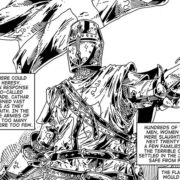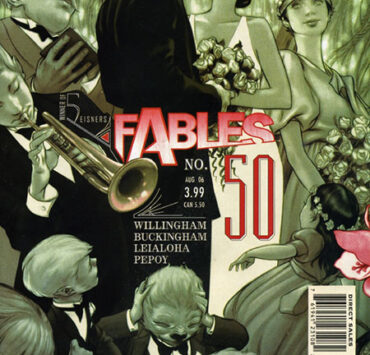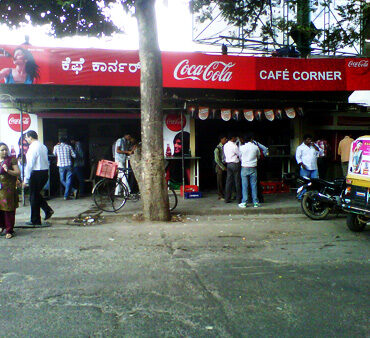Once upon a time, in a land far, far away, lived a little princess. And when she would grow up to be a young lady with all the finesse and charm that a lady is expected to have, she would be in danger.
And then she would whimper and suffer and sigh heavily… hoping for her prince to come; who, invariably, got a little lost and delayed, but would still always come to her rescue—usually on a horse. He always came and she was always rescued. Right in time to take a nice hot shower, put flowers in her hair, and get nicely manicured nails, for a gorgeous lavish wedding that the whole town would remember for a while. And they all lived Happily. Ever. Fucking. After.
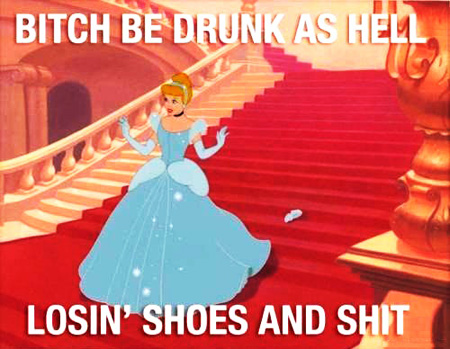
Even though the author has small feet that would fit in that glass slipper, she can’t walk in them.
One after another, us little girls were told lies in the form of these fairy tales. A new danger would bring a new prince. But each time they were in trouble, they were saved. And they always had such exceptionally nice hair. But then real life came along and we were told to buckle up and face the world. Quit the whining, don’t be a wuss. You are an independent, strong working woman and you don’t need any saving, they said. You don’t need a prince, and you’re not a damsel in distress. Sure, you’re “princess” in your own bubble, but there is no prince, and it was just a trick to get you to sleep. And all that we believed in was swept away in some long lost good night story.
Worst of all, there is no fairy godmother! No magical appearance of gorgeous gowns for an event that you didn’t have time to go shopping for, nothing less than a miracle can fix the frizz in your hair, and even though you have small feet that would fit in that glass slipper, you can’t walk in them!
So the majority of us girlies grew up to be highly dysfunctional teens, with unrealistic expectations from the opposite sex. Disappointed once, twice, thrice, we slowly got the hang of the game of lies, deceit, and the pretentious caring. We’d play along, sometimes even managing to convince ourselves. And then the tragedy struck and The End came looming along, sans Prince Charming or the magical dancing. In real life, you don’t get to have your cake and eat it too. Because it makes you fat.
In real life, you get up, put on heavy concealer, and go to work to pay those bills. In real life, you have to do the dishes and your nails get chipped and manicures get more expensive every year. In real life, the boy does not fight the ocean monsters to save you. You have to fight them yourselves. And cue… “So much for my happy ending…”
Growing up with unrealistic definitions of what maketh a princess/lady/main protagonist, and what you should expect the princes/men/valiant saviors to do for you, can be quite frustrating. I’ve certainly struggled between the illusion of safety and certainty they provide and the realities of my daily life where time, money, and who has fuel in their car decides the outcome of a relationship. It sometimes angers me that such stories were instilled into my childhood, thus making them virtually unforgettable. Which is why, when I first saw the trailers of Once Upon a Time, I was torn between leaving hateful comments on their YouTube channel and bookmarking it in my browser favourites.
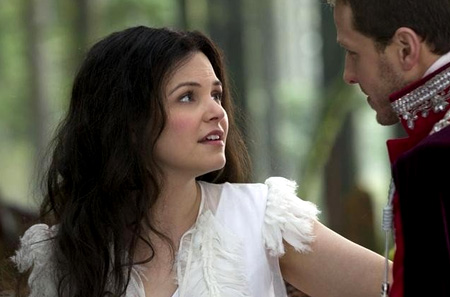
Snow White might have been a queen in Far Far Away, but in the real world, she’s the town tramp having an affair with a married man.
Once Upon a Time is a 2011 fantasy-drama T.V. series that follows Jennifer Morrison (from House, yay!) into a modern-day town full of traditional fairytale characters, who have been cursed to live in a world without magic. It flits back and forth between the magical land before the curse of the Evil Queen and the mundane of our world with routine dose of stagnation. I only came across the show when they started airing it in Colombia this year, but Once Upon a Time has been generating fans in the U.S. for some time now. For those of us sick of the same old drab happily ever after, Once Upon a Time is quite interesting, because it doesn’t quite have a happy ending. (The Grinch in me is not even attempting to hide my joy at their misery.)
Before I knew it, I had downloaded the entire first season and couldn’t sleep until I had seen all the episodes. I may have developed a slight disdain for their soap-opera like transitions, but I was definitely hooked on to the storyline. It’s fascinating how stark the personalities of the leading ladies are, when compared to their fairytale versions. Juxtaposed with the ideal imaginary world of perfection, this small town of “Storybrooke” is rife with the trials and tribulations of the real world. Snow White might have been a queen in Far Far Away, but in the real world, she’s the town tramp having an affair with a married man. Cinderella is a pregnant minor, whose boyfriend abandons her; Red is a frustrated waitress at the local diner; and the Genie is an underpaid reporter (ouch). Even the Evil Dark Queen has been reduced to the nominal town Mayor, who needs the City Council’s approval for a children’s playground budget. Once Upon a Time is a modern-day fairytale with cars breaking down, daily chores, and losing hope. Not exactly what parents usually have in mind for fairy tales.
But even that paradigm is changing. Some recent studies in the U.S. indicate that parents have stopped reading fairytales to their children, fearing that the implied messages in them are harmful to their innocent and impressionable minds. Cinderella speaks of child labor, rebellious Little Mermaid Ariel runs away from home after a man, and Little Red Riding Hood gets in trouble with after talking to a stranger. With such “gruesome” story lines, some concerned parents have taken the decision to shield their children from the tales of the Brothers Grimm.
I personally find this extremely hilarious. For one, there’s no way you can shield your children from anything unless you’re Mormon and shun high-speed Internet connections. Secondly, the same implied messages and morals at the end of the story were originally used by parents to introduce subliminal warning and rules of conduct into our naive minds: Red got into trouble speaking to strangers—so don’t speak to strangers. Snow White took an apple (the equivalent of candy, of course) from a strange lady and went into a coma—so don’t take candy from people you don’t know. The Little Mermaid made a bad deal with the underwater sea monster—so always read the fine print before agreeing to the Terms and Conditions. It’s of course another story all together that those warnings were completely ignored, and people, like me, threw their degrees from Disney, and caution, into the wind. All that brainwashing didn’t stop me from talking to strangers outside restrooms, routinely accepting free drinks at bars and blindly signing my soul and my kneecap away to faceless entities for money every month.
At the end of the day, there really isn’t a distinction between good and bad like there is in fairytales. Love isn’t like what they tell you in the stories; it’s more like a tactical game involving mutual vested interests. Or like King George says in Once Upon a Time to Snow White: “It will break his heart. And that will cure him.” The show not only reminds you of how shallow our image of utopia is, but also how futile it is to aspire to live in one. As a child, I suppose it is necessary to be allowed that certain window of time to believe in endless possibilities, the power or loyalty, and the bravery of common men (and women). But it becomes an unfortunate affliction when you carry forward the same hopes and expectations from life, yourself, and others into adulthood.
Having said that, I fucking love Disney fairytales.





